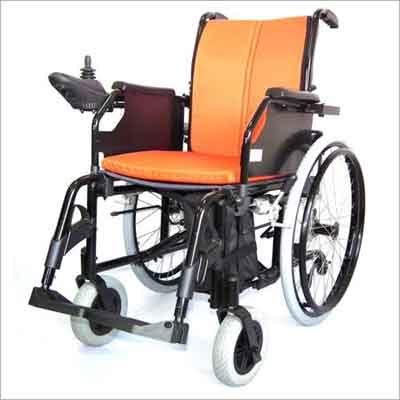- Home
- Editorial
- News
- Practice Guidelines
- Anesthesiology Guidelines
- Cancer Guidelines
- Cardiac Sciences Guidelines
- Critical Care Guidelines
- Dentistry Guidelines
- Dermatology Guidelines
- Diabetes and Endo Guidelines
- Diagnostics Guidelines
- ENT Guidelines
- Featured Practice Guidelines
- Gastroenterology Guidelines
- Geriatrics Guidelines
- Medicine Guidelines
- Nephrology Guidelines
- Neurosciences Guidelines
- Obs and Gynae Guidelines
- Ophthalmology Guidelines
- Orthopaedics Guidelines
- Paediatrics Guidelines
- Psychiatry Guidelines
- Pulmonology Guidelines
- Radiology Guidelines
- Surgery Guidelines
- Urology Guidelines
Indian researchers design smart wheelchair

New Delhi : Indian researchers have developed a novel wheelchair navigation system that can make the movable chairs avoid obstacles on their own and also sense when the user is tired or stressed.
The smart wheelchair could also monitor user's heart rate, temperature or other vital signs for diagnostic purposes, the researchers said.
Naveen Kumar Malik of the Department of Electronics and Communication at Maharishi Dayanand University in Haryana and V.R. Singh of the National Physical Laboratory here described the details of their "human inspired cognitive wheelchair navigation system" in the International Journal of Human Factors Modelling and Simulation.
The smart wheelchair controller incorporates enhanced safety features and warning systems to assist users more effectively than any conventional powered wheelchair, the researchers said.
The microcontroller is programmed with an algorithm that has six levels of testing surroundings and the user's voice to make the wheelchair "smart", creating what the team described as a cognitive wheelchair navigation system.
The system circumvents several of the problems facing users and carers where conventional unpowered or powered wheelchairs are being used, especially by weaker users or users with cognitive impairment.
The new microcontroller system endows the smart wheelchair with a collision avoidance and warning system, a system to discern emotional distress or drowsiness in the user and provide a warning of possible problems that might arise in such situations to the user or carer.
The team has now built and demonstrated a prototype of their smart wheelchair controller and hopes to commercialise the system.
"The commercial version of the prototyped autonomous wheelchair would reduce the burden on care-giving staff in healthcare industry and improve the quality of life for disabled persons," the researchers said.

Disclaimer: This site is primarily intended for healthcare professionals. Any content/information on this website does not replace the advice of medical and/or health professionals and should not be construed as medical/diagnostic advice/endorsement or prescription. Use of this site is subject to our terms of use, privacy policy, advertisement policy. © 2020 Minerva Medical Treatment Pvt Ltd